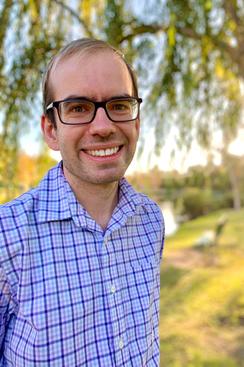Each year a small percentage of active referees of the Physical Review journals are selected and honored by the American Physical Society, or APS, with the “Outstanding Referee” designation. The number, quality, and timeliness of referee reports determine the selections. Outstanding Referee is a lifetime award.
UC Riverside physicist Simeon Bird is among the 146 Outstanding Referees for 2022, as chosen by the journal editors. Instituted in 2008, the Outstanding Referee program recognizes the work that anonymous peer reviewers do for the Physical Review journals.
The selection this year was made from 40 years of records on more than 82,000 referees who were called upon to review manuscripts, including more than 40,000 manuscripts submitted in 2021. The 2022 honorees come from 29 different countries, with large contingents from the U.S., Germany, Italy, France, Spain, and the U.K. All recipients receive a lapel pin and a certificate to commemorate their achievement.
An assistant professor of physics and astronomy at UCR, Bird received his doctoral degree from the University of Cambridge. He was an Einstein Fellow at Johns Hopkins University, a McWilliams Fellow at Carnegie Mellon University, and a postdoctoral researcher at the Institute for Advanced Study.
His interests include various aspects of theoretical and numerical cosmology. This research involves performing large-scale numerical simulations of the universe — simulations that help measure the mass of the neutrino and understand the nature of dark matter as well as how galaxies form. His most famous work was to suggest that the black holes detected by the gravitational wave experiment LIGO could have been created in the early universe, a result of the direct collapse of dense blobs of matter.
His current main interests are in emulator technologies: building models to interpolate between expensive simulations with different cosmological parameters using Bayesian statistics. He is also interested in increasing the effective size of simulations using machine learning.
The APS is a non-profit membership organization working to advance and diffuse the knowledge of physics through its outstanding research journals, scientific meetings, and education, outreach, advocacy and international activities. It represents over 55,000 members, including scientists and professionals in physics-related disciplines in academia, national laboratories, government, and industry in the U.S. and throughout the world.
AUTHOR:
IQBAL PITTALWALA
March 4, 2022
